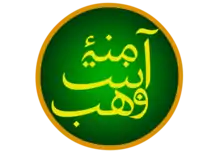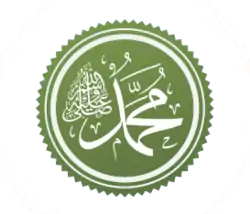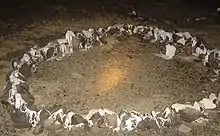Aminah
Amna bint Wahb (Arabic: آمِنَة بِنْت وَهْب ʾĀmna ʾibnat Wahb, died 577 AD) was the mother of the Islamic prophet Muhammad.[1]
Amna bint Wahab آمِنَة بِنْتُ وَهْب | |
|---|---|
 Amna bint Wahab name in Islamic calligraphy | |
| Born | 549 CE / 66 BH |
| Died | 577-578 CE / 46 BH Al-Abwa, Arabia |
| Resting place | Al-Abwa, Arabia |
| Known for | Mother of Muhammad |
| Spouse(s) | Abdullah ibn Abd al-Muttalib (m. 569-570) |
| Children | Muhammad |
| Parents |
|
| Relatives | Khadija bint Khuwaylid (daughter in-law) Qasim ibn Muhammad (grandson) Zainab bint Muhammad (granddaughter) Ruqayyah bint Muhammad (granddaughter) Umm Kulthum bint Muhammad (granddaughter) Abdullah ibn Muhammad (grandson) Fatimah bint Muhammad (granddaughter) Ibrahim ibn Muhammad (grandson) |
| Part of a series on |
| Muhammad |
|---|
 |
|
Early life and marriage
Amna was born to Wahb ibn Abd Manaf and Barrah bint ‘Abd al ‘Uzzā ibn ‘Uthmān ibn ‘Abd al-Dār in Mecca. She was a member of the Banu Zuhrah clan in the tribe of Quraysh who claimed descent from Abraham through his son Ishmael. Her ancestor Zuhrah was the elder brother of Qusayy ibn Kilab, who was also an ancestor of Abdullah ibn Abdul-Muttalib. Qusayy ibn Kilab became the first Quraysh custodian of the Kaaba.
Abdul Mutallib proposed the marriage of Abdullah, his youngest son, and Aminah. Some sources state that Aminah's father accepted the match, while others say that it was Aminah's uncle Wuhaib, who was serving as her guardian.[2][3] The two were married soon after.[3]
Abdullah spent much of Aminah's pregnancy away from home as part of a merchant caravan, and died of disease before the birth of his son.[3][4]
Birth of Muhammad
Three months after Abdullah's death, in 570 AD, Muhammad was born. As was tradition among all the great families at the time, Aminah sent Muhammad to live with a milk mother in the desert as a baby. The belief was that in the desert, one would learn self-discipline, nobility, and freedom. During this time, Muhammad was nursed by Halimah bint Abi Dhuayb, a poor Bedouin woman from the tribe of Banu Sa'ad, a branch of the Hawāzin.[5]
When Muhammad was six years old, he was reunited with Aminah, who took him to visit her relatives in Yathrib (later Medina). Upon their return to Mecca a month later, accompanied by her slave Umm Ayman, Aminah fell ill.

She died around the year 577 or 578 AD[7] and was buried in the village of Abwa'. The young Muhammad was taken in first by his paternal grandfather Abd al-Muttalib and later by his paternal uncle Abu Talib ibn Abd al-Muttalib.[3]
Fate in the afterlife
Islamic scholars have long been divided over the religious beliefs of Muhammad's mother and her fate in the afterlife.[8] One transmission by Abu Dawud and Ibn Majah states that God refused to forgive Aminah for her disbelief. Another transmission in Musnad al-Bazzar states that the Muhammad's mother was brought back to life and accepted Islam then returned to the barzakh.[9] Some Ashʿari and Shafi‘i scholars argued that neither would be punished in the afterlife, as they were ahl al-fatrah, or "people of the interval" between the prophetic messages of Jesus and Muhammad.[10] The concept of ahl al-fatrah is not universally accepted among Islamic scholars, and there is debate concerning the extent of salvation available for active practitioners of polytheism,[11] though the majority of scholars have come to agree with it and disregard the ahadith stating that Muhammad's parents were condemned to hell.[8]
While a work attributed to Abu Hanifa, an early Sunni scholar, stated that both Aminah and Abdullah died upon their innate nature (Mata 'ala al-fitra),[12] some later authors of mawlid texts related a tradition in which Aminah and Abdullah were temporarily revived and embraced Islam. Scholars like Ibn Taymiyya stated that this was a lie, though al-Qurtubi stated that the concept did not disagree with Islamic theology.[10] According to Ali al-Qari, the preferred view is that both the parents of Muhammad were Muslims.[13] According to Al-Suyuti, Isma'il Haqqi, and other Islamic scholars all of the narrations indicating that the parents of Muhammad were not forgiven were later abrogated when they were brought to life and accepted Islam.[14] Shia Muslims believe that all of Muhammad's ancestors, Aminah included, were monotheists and therefore entitled to paradise. A Shia tradition states that God forbade the fires of hell from touching either of Muhammad's parents.[15]
See also
- Family tree of Muhammad
- Halah bint Wahb
- Sahaba
- Wahb (name)
References
- Muhammad Mustafa Al-A'zami (2003), The History of The Qur'anic Text: From Revelation to Compilation: A Comparative Study with the Old and New Testaments, p.22, 24. UK Islamic Academy. ISBN 978-1872531656.
- Muhammad Shibli Numani, M. Tayyib Bakhsh Badāyūnī (1979). Life of the Prophet. Kazi Publications. pp. 148–150.
- Ibn Ishaq (1955). Ibn Hisham (ed.). Life of Muhammad. Translated by A. Guillaume. Oxford University Press. pp. 68–79.
- Ibn Sa'd/Haq pp. 107-108.
- "Muhammad: Prophet of Islam", Encyclopædia Britannica, 28 September 2009. Retrieved on 28 September 2009.
- Daniel Howden (18 April 2006). "Shame of the House of Saud: Shadows over Mecca". The Independent. Retrieved 5 November 2018.
- Peters, F.E. Muhammad and the Origins of Islam. State University of New York Press: Albany, 1994. ISBN 0-7914-1876-6.
- Brown, Jonathan A.C. (2015). Misquoting Muhammad: The Challenge and Choices of Interpreting the Prophet's Legacy. Oneworld Publications. pp. 188-189.
- Mufti Muhammad Khan Qadri, The Parents of the Prophet Muhammad were Muslims, Suffah Foundation, p. 11
- Holmes Katz, Marion (2007). The Birth of The Prophet Muhammad: Devotional Piety in Sunni Islam. Routledge. p. 126-128. ISBN 9781135983949.
- Rida, Rashid. "2:62". Tafsir al-Manar. pp. 278–281. Archived from the original on 2018-11-05. Retrieved 2018-11-06.
- Dr. `Inayatullah Iblagh al-Afghanistani, Refuting the Claim that Imam Abu Hanifa was of the opinion that the Prophet’s Parents were Kafirs, Masud
- Mufti Muhammad Khan Qadri, The Parents of the Prophet Muhammad were Muslims, Suffah Foundation, p. 28
- Mufti Muhammad Khan Qadri, The Parents of the Prophet Muhammad were Muslims, Suffah Foundation, p. 24
- Rubin, Uri (1975). "Pre-Existence and Light—Aspects of the Concept of Nur Muhammad". Israel Oriental Studies. 5: 75–88.